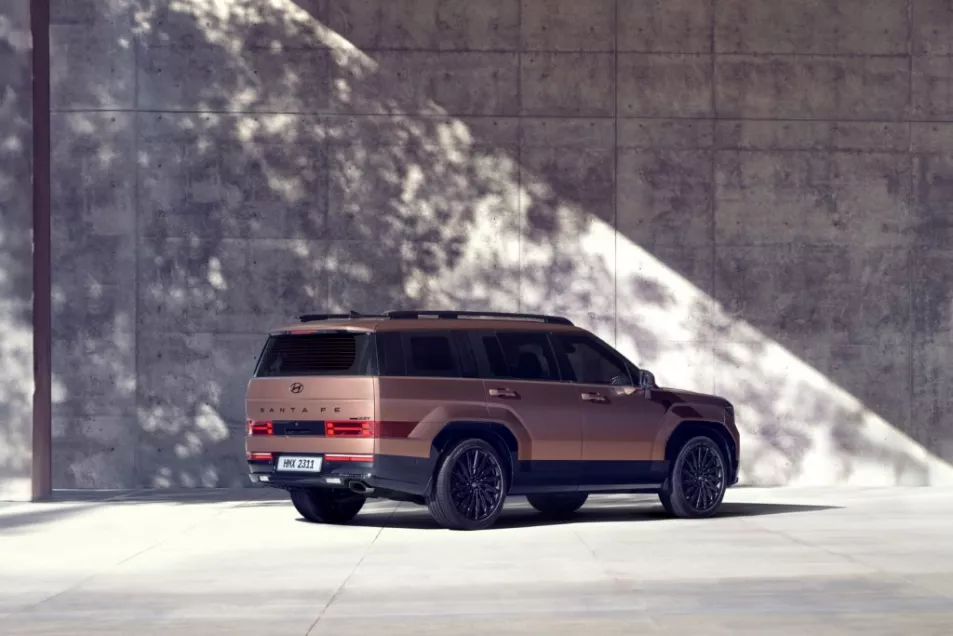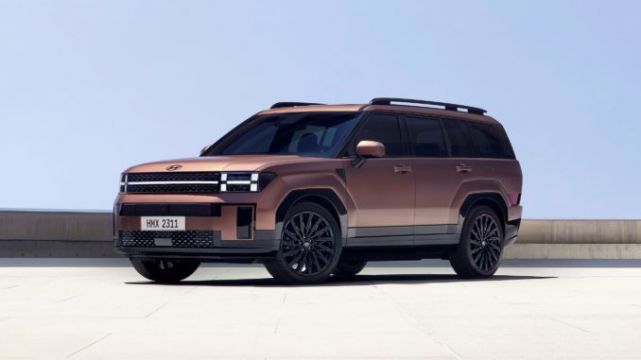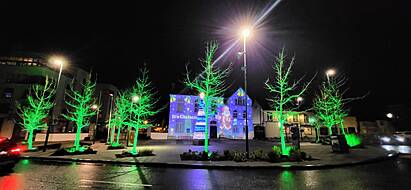Hyundai’s Santa Fe SUV has long been a critical component of the brand’s journey from the bargain-basement to semi-premium respectability. Especially since the second-generation model, it’s a car which allowed Hyundai to be at least mentioned in the same breath as premium-badge cars, and with the two previous generations, it’s frequently had the bettering of those posh models.
Now, it looks as if Hyundai is going to challenge those premium brands head-on, with this, the fifth generation of the Santa Fe.

The first thing you’re going to notice is that Hyundai seems to be laying down a gauntlet, at least in styling terms, to Land Rover. There are obvious hints of the current Land Rover Defender in the new Santa Fe’s design, as well as some similarity to the mid-2000s Ford Flex SUV, a rather stylish model that was never sold in Europe. The chunky wheelarches hold 21-inch allow wheels.
The Santa Fe gets distinctive H-shaped lights at both front and rear, and the front overhang (the amount by which the nose sticks out beyond the front wheels) has been shortened to give it a snub-nosed, off-road-y look. That’s also been done, in part, to balance the car’s overall length as both the wheelbase and the rear overhang have been lengthened.
That has been done to give the Santa Fe even more cabin space. Indeed, Hyundai claims that when you fold down the two rows of rear seats, you end up with a ‘terrace-like feel’ allowing you to open up the boot lid and use the car as your own mobile patio. Or semi-alfresco work station, perhaps?
Although there are no details yet on precisely how much space is available inside, Hyundai does claim that: “The Santa Fe [is] a scene stealer in urban settings, allowing young families to use the rear area for a wide variety of purposes, such as grocery shopping, home improvement projects, sports and recreation, gardening, family outings and pet transportation.”


The cabin’s design owes an obvious debt to the current Ioniq 5 and Ioniq 6 electric cars, with a big screen displaying both the driver’s instruments and the infotainment screen, as well as a general sense of airiness and space. Hyundai’s clearly aiming for a luxurious ambience too, with wood-effect trim and optional Nappa leather seats.
There are more sustainable materials in the cabin, though, with the likes of the suede headliner, floor mats, and second- and third-row seatbacks being made from recycled plastic, while the door trim covers are made from eco-friendly leatherette.
Engine-wise, it looks as if the Santa Fe won’t get an all-electric version (that will be left to Ioniq 7, which shares its platform with the new Kia EV9) and instead will once again be offered as a plug-in hybrid, likely with a larger battery to extend its electric-only range.
“The all-new Santa Fe is an SUV that finds a perfect balance between city life and the great outdoors, handling everything from busy family itineraries to car camping adventures,” said SangYup Lee, Hyundai’s head of design. “With its longer wheelbase, roomy interior and terrace-like tailgate space, the new Santa Fe leans into its SUV strengths to offer more versatility than ever before as well as a premium customer experience.”







